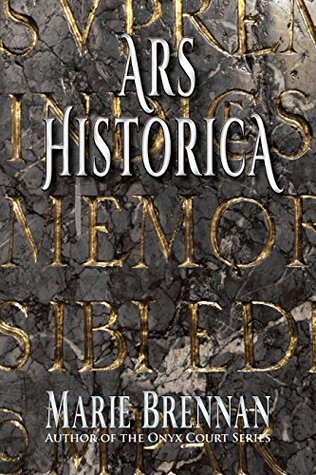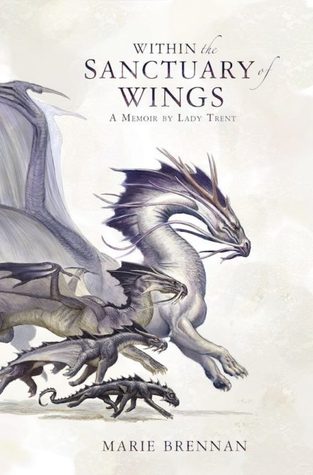Kit Marlowe. Guy Fawkes. Ada Lovelace. Kings and sailors and sainted nuns populate these seven stories of historical fantasy by award-winning author Marie Brennan. They span the ages from the second century B.C.E. to the nineteenth century C.E., from ancient Persia to the London of the Onyx Court. Discover the secret histories, hear the stories that have never been told -- until now.
After nearly five decades (and, indeed, the same number of volumes), one might think they were well-acquainted with the Lady Isabella Trent--dragon naturalist, scandalous explorer, and perhaps as infamous for her company and feats of daring as she is famous for her discoveries and additions to the scientific field.
And yet--after her initial adventure in the mountains of Vystrana, and her exploits in the depths of war-torn Eriga, to the high seas aboard The Basilisk, and then to the inhospitable deserts of Akhia--the Lady Trent has captivated hearts along with fierce minds. This concluding volume will finally reveal the truths behind her most notorious adventure--scaling the tallest peak in the world, buried behind the territory of Scirland's enemies--and what she discovered there, within the Sanctuary of Wings.
In a recent panel on worldbuilding, you mentioned that you've taught creative writing classes a few times. What, in your experience, do writers struggle most with and why?
It varies wildly from student to student, as you might expect. There's no single answer on a craft level; one person might be great at plot while another struggles to create tension and movement, or somebody might have beautiful prose while another's words are clunky and flat. Same thing goes for how they feel about their writing, the psychological side of things.
But if I go up one level of abstraction, I think I could say the most common problem I've encountered is difficulty seeing one's own work clearly. Because that can apply in multiple directions: one person is very insecure and convinced their stories aren't ready for the public eye, even though I'm urging them to start submitting, while another person loves everything they've done and has no interest in revision, even though I've pointed out a number of key flaws that really need fixing. Some people write the same basic story over and over again, insisting that tiny, cosmetic alterations mean this really is a very different tale. Others are determined to pursue a genre or tone they have no knack for, while ignoring the ease and flair with which they write something else entirely.
Objectivity is difficult to achieve -- maybe impossible. That's why we have teachers and beta readers and critique groups, to help give us a new perspective on our work. But that still requires you to sort through the advice you get and figure out which parts ring true, and that's much easier said than done.
Indeed it is! Your series, The Memoirs of Lady Trent follows Isabella, Lady Trent, a renowned dragon naturalist. What about Isabella was most fun to write?
Her voice. Hands-down.
I've never had a narrator's voice come to life for me that vividly, that fast. I was maybe two paragraphs into the first chapter of A NATURAL HISTORY OF DRAGONS when I knew exactly what she sounded like, and the voice carried me through all five books. There were times where I struggled with my plot or the underlying ideas of the story, but on the level of the prose, it was like all I had to do was sit for a moment and listen to her talk.
And it made me miss her when I finished the series. I've never felt quite so much like the protagonist of a story was a good friend, one who moved to another state when the story was done.
We love Lady Trent, and we are glad she is preserved in books we can read over and over again! On November 7, your ebook of short stories, Ars Historica, came out. I'm especially intrigued by the story involving Guy Fawkes. What about Guy Fawkes fascinates you most?
The fact that he's the one name everybody associates with the Gunpowder Plot -- but he wasn't actually the one behind it.The whole thing was spearheaded by a guy named Robin Catesby, but very few people remember him, because he wasn't the one found babysitting a pile of gunpowder underneath Westminster Palace. Catesby was a charismatic leader who gathered a whole pack of men to his cause, most of whom died for it in the end. I wound up being morbidly intrigued by the entire plot: what led these men to plan such an act of terrorism and murder, what they thought they would gain from it, etc.
What turned my curiosity into a story was the discovery that there was a Jesuit priest, Father Henry Garnet, who knew about the plan and opposed it, but kept it secret anyway. Because he heard about it when he took the confession of one of the conspirators, and under Catholic doctrine, he was spiritually prohibited from sharing that information without leave -- even though he knew they were planning mass murder. To me, the struggle Father Garnet went through was the most tragic part of the whole thing. And that wound up being my entry point into making this a story, rather than just a recap of history.
Fascinating! (And poor Father Garnet.) What are some of your current projects?
Normally my answer to this is just a single novel, which at the moment is a follow-up to the Memoirs of Lady Trent, concerning Lady Trent's granddaughter, black market antiquities smugglers, and the translation of an ancient epic.
But at the moment I'm involved with a whole lot of things: not just that novel but some freelance fiction writing for the game Legend of the Five Rings, freelance setting writing for the Tiny D6 game line, a Serial Box project whose details I can't reveal just yet, and a whole slew of possible future novels that are all currently hanging fire, waiting to discover which ones of them I will be doing when and in what order. Furthermore, I have an ongoing Patreon project, New Worlds, that explores different facets of worldbuilding. So it's busy times around here!
Buy: Amazon.com ~ Barnes & Noble
Buy: BookPassage ~ Amazon.com ~ Barnes & Noble ~ IndieBound



















No comments:
Post a Comment